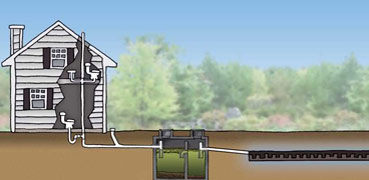
We get this question a lot. It is important to know that regular maintenance is the most important thing in making sure your septic system works well.
Regular pumping helps prevent solids from escaping into the drainfield and clogging soil pores. While pumping frequency is a function of use, MassDEP recommends that systems be pumped at least once every three years for homes not having a garbage disposal. If the home's system has a garbage disposal, it should be pumped every year.
If you are a nonresidential system owner, you should determine how often to pump based on prior accumulation and pumping records. Often you can look at pumping intervals to gauge your pumping schedule (i.e., previously did you wait too long before having your tank pumped and it was filled to capacity, or could you have waited a little longer to pump?).
An amazing number of system owners believe that if they haven't had any problems with their systems, they don't need to pump out their tanks. Unfortunately this is a serious and sometimes costly misconception. As your system is used, solid materials settle to the bottom of the tank, forming a sludge layer. Grease and lightweight materials float to the surface of the septic tank as scum.
Normally, properly designed tanks have enough space for up to three to five years' safe accumulation of sludge. When the sludge level increases beyond this point, sewage has less time to settle properly before leaving the tank. As the sludge level increases, more solid wastes escape into the soil absorption system (SAS). If the SAS becomes so clogged that it cannot absorb liquid at the rate at which it enters the tank, the plumbing will "back up" or unsanitary wastewater will bubble to the surface.
When hiring a pumper, be sure the local Board of Health has licensed them, and always make sure you get a paid receipt from the pumper that spells out the details of the transaction (how many gallons were pumped out of the tank, the date, the charges, and any other pertinent results). Retain this receipt for your records. The pumper sends a copy of this report to the local Board of Health.
For more information, contact Morse Engineering and Construction.
